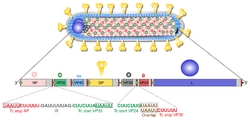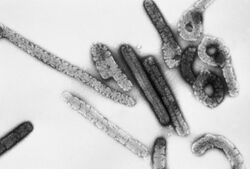Biology:Marburgvirus
| Marburgvirus | |
|---|---|

| |

| |
| Marburg virus structure, genome, and transmission electron micrograph | |
| Virus classification | |
| (unranked): | Virus |
| Realm: | Riboviria |
| Kingdom: | Orthornavirae |
| Phylum: | Negarnaviricota |
| Class: | Monjiviricetes |
| Order: | Mononegavirales |
| Family: | Filoviridae |
| Genus: | Marburgvirus |
| Species and member viruses | |
| |
The genus Marburgvirus is the taxonomic home of Marburg marburgvirus, whose members are the two known marburgviruses, Marburg virus (MARV) and Ravn virus (RAVV). Both viruses cause Marburg virus disease in humans and nonhuman primates, a form of viral hemorrhagic fever.[1] Both are select agents,[2] World Health Organization Risk Group 4 Pathogens (requiring Biosafety Level 4-equivalent containment),[3] National Institutes of Health/National Institute of Allergy and Infectious Diseases Category A Priority Pathogens,[4] Centers for Disease Control and Prevention Category A Bioterrorism Agents,[5] and are listed as Biological Agents for Export Control by the Australia Group.[6]
Use of term
The genus Marburgvirus is a virological taxon included in the family Filoviridae, order Mononegavirales.[7] The genus currently includes a single virus species, Marburg marburgvirus.[7] The members of the genus (i.e. the actual physical entities) are called marburgviruses.[7] The name Marburgvirus is derived from the city of Marburg in Hesse, West Germany (where Marburg virus was first discovered), and the taxonomic suffix -virus (which denotes a virus genus). Even though the virus was named after the city of Marburg, Dr. Ana Gligic, lead virologist at a laboratory in Belgrade, was first who managed to isolate the virus.[7][8]
Previous designations
Until 1998, the family Filoviridae contained only one genus, Filovirus.[9] Once it became clear that marburgviruses and ebolaviruses are fundamentally different, this genus was abolished and a genus "Marburg-like viruses" was established for marburgviruses.[10][11] In 2002, the genus name was changed to Marburgvirus,[12][13] and in 2010 and 2011 the genus was emended.[7][14]
Genus inclusion criteria
A virus that fulfills the criteria for being a member of the family Filoviridae is a member of the genus Marburgvirus if[7][14]
- its genome has one gene overlap
- its fourth gene (GP) encodes only one protein (GP1,2) and cotranscriptional editing is not necessary for its expression
- peak infectivity of its virions is association with particles ≈665 nm in length
- its genome differs from that of Marburg virus by <50% at the nucleotide level
- its virions show almost no antigenic cross reactivity with ebolavirions
Genus organization
| Species name | Virus name (abbreviation) |
| Marburg marburgvirus | Marburg virus (MARV) |
| Ravn virus (RAVV) |
Marburg marburgvirus
The species was introduced in 1998 as Marburg virus.[10][11]
Because of easy confusion with its virus member Marburg virus, the species name was changed to Lake Viktoria marburgvirus in 2005.[12][15]
In 2010, it was proposed to change the name to Marburg marburgvirus,[7] and this proposal was accepted in early 2012 by the ICTV.
Marburg marburgvirus (also referred to as Lake Victoria marburgvirus[16]) is a virological taxon (i.e. a man-made concept) included in the genus Marburgvirus, family Filoviridae, order Mononegavirales. The species has two virus members, Marburg virus (MARV) and Ravn virus (RAVV).[17][7] The members of the species (i.e. the actual physical entities) are called Marburg marburgviruses.[7] The name Marburg marburgvirus is derived from the city of Marburg in Hesse, West Germany (where Marburg virus was first discovered), and the taxonomic suffix marburgvirus (which denotes a marburgvirus species).[7]
Species inclusion criteria
A virus that fulfills the criteria for being a member of the genus Marburgvirus is a member of the species Marburg marburgvirus if it has the properties of marburgviruses (because there is currently only marburgvirus species) and if its genome differs from that of Marburg virus (variant Musoke) by <30% at the nucleotide level.[7]
References
- ↑ Spickler, Anna. "Ebolavirus and Marburgvirus Infections". http://www.cfsph.iastate.edu/Factsheets/pdfs/viral_hemorrhagic_fever_filovirus.pdf.
- ↑ US Animal and Plant Health Inspection Service (APHIS) and US Centers for Disease Control and Prevention (CDC). "National Select Agent Registry (NSAR)". http://www.selectagents.gov. Retrieved 2011-10-16.
- ↑ US Department of Health and Human Services. "Biosafety in Microbiological and Biomedical Laboratories (BMBL) 5th Edition". https://www.cdc.gov/biosafety/publications/bmbl5/. Retrieved 2011-10-16.
- ↑ US National Institutes of Health (NIH), US National Institute of Allergy and Infectious Diseases (NIAID). "Biodefense – NIAID Category A, B, and C Priority Pathogens". Archived from the original on 2011-10-22. https://web.archive.org/web/20111022004715/http://www.niaid.nih.gov/topics/biodefenserelated/biodefense/research/pages/cata.aspx. Retrieved 2011-10-16.
- ↑ US Centers for Disease Control and Prevention (CDC). "Bioterrorism Agents/Diseases". Archived from the original on 2014-07-22. https://web.archive.org/web/20140722181901/http://www.bt.cdc.gov/agent/agentlist-category.asp. Retrieved 2011-10-16.
- ↑ The Australia Group. "List of Biological Agents for Export Control". Archived from the original on 2011-08-06. https://web.archive.org/web/20110806112546/http://www.australiagroup.net/en/biological_agents.html. Retrieved 2011-10-16.
- ↑ 7.00 7.01 7.02 7.03 7.04 7.05 7.06 7.07 7.08 7.09 7.10 Kuhn, J. H.; Becker, S.; Ebihara, H.; Geisbert, T. W.; Johnson, K. M.; Kawaoka, Y.; Lipkin, W. I.; Negredo, A. I. et al. (2010). "Proposal for a revised taxonomy of the family Filoviridae: Classification, names of taxa and viruses, and virus abbreviations". Archives of Virology 155 (12): 2083–2103. doi:10.1007/s00705-010-0814-x. PMID 21046175.
- ↑ NOTE: Marburgvirus is pronounced /ˌmɑːrbɜːrɡˈvaɪrəs/ MAR-burg-VY-rəs, and Marburg marburgvirus is pronounced /ˈmɑːrbɜːrɡ ˌmɑːrbɜːrɡˈvaɪrəs/ MAR-burg MAR-burg-VY-rəs. According to the rules for taxon naming established by the International Committee on Taxonomy of Viruses (ICTV), the name Marburg marburgvirus is always to be capitalized, italicized, never abbreviated, and to be preceded by the word "species". The names of its members (Marburg marburgviruses) are to be capitalized, are not italicized, and used without articles; according to Kuhn.
- ↑ Kiley, M. P.; Bowen, E. T.; Eddy, G. A.; Isaäcson, M.; Johnson, K. M.; McCormick, J. B.; Murphy, F. A.; Pattyn, S. R. et al. (1982). "Filoviridae: A taxonomic home for Marburg and Ebola viruses?". Intervirology 18 (1–2): 24–32. doi:10.1159/000149300. PMID 7118520.
- ↑ 10.0 10.1 Netesov, S. V.; Feldmann, H.; Jahrling, P. B.; Klenk, H. D.; Sanchez, A. (2000). "Family Filoviridae". in van Regenmortel, M. H. V.; Fauquet, C. M.; Bishop, D. H. L. et al.. Virus Taxonomy—Seventh Report of the International Committee on Taxonomy of Viruses. San Diego, USA: Academic Press. pp. 539–48. ISBN 978-0-12-370200-5.
- ↑ 11.0 11.1 Pringle, C. R. (1998). "Virus taxonomy—San Diego 1998". Archives of Virology 143 (7): 1449–1459. doi:10.1007/s007050050389. PMID 9742051.
- ↑ 12.0 12.1 Feldmann, H.; Geisbert, T. W.; Jahrling, P. B.; Klenk, H.-D.; Netesov, S. V.; Peters, C.; Sanchez, A.; Swanepoel, R. et al. (2005). "Family Filoviridae". in Fauquet, C. M.; Mayo, M. A.; Maniloff, J. et al.. Virus Taxonomy—Eighth Report of the International Committee on Taxonomy of Viruses. San Diego, USA: Elsevier/Academic Press. pp. 645–653. ISBN 978-0-12-370200-5.
- ↑ Mayo, M. A. (2002). "ICTV at the Paris ICV: results of the plenary session and the binomial ballot". Archives of Virology 147 (11): 2254–60. doi:10.1007/s007050200052.
- ↑ 14.0 14.1 Kuhn, J. H.; Becker, S.; Ebihara, H.; Geisbert, T. W.; Jahrling, P. B.; Kawaoka, Y.; Netesov, S. V.; Nichol, S. T. et al. (2011). "Family Filoviridae". in King, Andrew M. Q.; Adams, Michael J.; Carstens, Eric B. et al.. Virus Taxonomy—Ninth Report of the International Committee on Taxonomy of Viruses. London, UK: Elsevier/Academic Press. pp. 665–671. ISBN 978-0-12-384684-6. https://archive.org/details/virustaxonomyixt00king.
- ↑ Mayo, M. A. (2002). "ICTV at the Paris ICV: results of the plenary session and the binomial ballot". Archives of Virology 147 (11): 2254–60. doi:10.1007/s007050200052.
- ↑ "ICTV Taxonomy history: Marburg marburgvirus" (in en) (html). https://ictv.global/taxonomy/taxondetails?taxnode_id=20181571. Retrieved 31 December 2018.
- ↑ "ICTV 9th Report (2011) Filoviridae" (in en) (html). https://talk.ictvonline.org/ictv-reports/ictv_9th_report/negative-sense-rna-viruses-2011/w/negrna_viruses/197/filoviridae. Retrieved 31 December 2018. "List of species in the genus Marburgvirus Lake Victoria marburgvirus* Marburg virus - Musoke, Kenya, 1980 [Z12132=NC_001608] (MARV-Mus) Ravn virus - Ravn, Kenya, 1987 [DQ447649] (RAVV-Rav) Highlight: Species names are in italic script; names of strains and isolates are in roman script; sequence accession numbers [ ] and assigned abbreviations ( ) are also listed."
Further reading
- Klenk, Hans-Dieter (1999). Marburg and Ebola Viruses. Current Topics in Microbiology and Immunology, vol. 235. Berlin, Germany: Springer-Verlag. ISBN 978-3-540-64729-4.
- Klenk, Hans-Dieter; Feldmann, Heinz (2004). Ebola and Marburg Viruses – Molecular and Cellular Biology. Wymondham, Norfolk, UK: Horizon Bioscience. ISBN 978-0-9545232-3-7.
- Kuhn, Jens H. (2008). Filoviruses – A Compendium of 40 Years of Epidemiological, Clinical, and Laboratory Studies. Archives of Virology Supplement, vol. 20. Vienna, Austria: SpringerWienNewYork. ISBN 978-3-211-20670-6.
- Martini, G. A.; Siegert, R. (1971). Marburg Virus Disease. Berlin, Germany: Springer-Verlag. ISBN 978-0-387-05199-4.
- Ryabchikova, Elena I.; Price, Barbara B. (2004). Ebola and Marburg Viruses – A View of Infection Using Electron Microscopy. Columbus, Ohio, USA: Battelle Press. ISBN 978-1-57477-131-2.
External links
Wikidata ☰ {{{from}}} entry
 |
